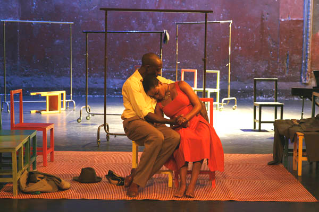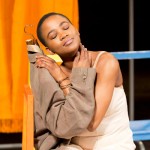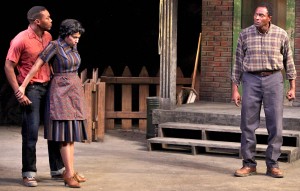 Matilda (Nanhlanhla Kheswa) in the arms of her loving and doting husband Philemon (Ivanno Jeremiah)
Matilda (Nanhlanhla Kheswa) in the arms of her loving and doting husband Philemon (Ivanno Jeremiah)
THE SUIT: Drama. Adapted by Peter Brook, Marie-Hélène Estienne and Franck Krawczyk from the story and play by Can Themba, Mothobi Mutloatse and Barney Simon. American Conservatory Theater, 415 Geary St., San Francisco. (415) 749-2228. www.act-sf.org. Through May 18, 2014
THE SUIT with an international cast is riveting at A.C.T. [rating:5] (5 of 5 Stars)
It was 30 years ago that San Francisco audiences were treated to a magnificent spectacular production of A Midsummer’s Night Dream by the Royal Shakespeare Company directed by the brilliant Peter Brooks. It is a pity we had to wait so long to see the culmination of his latest opus The Suit that has been created in alliance with a talented aggregate of adapters, musicians and actors. For this 75 minute production the term spectacular is replaced by simplistic but is equally as brilliant and magnificent as Dream.
The simple setting is populated with colorful unadorned wooden chairs, metal-pipe clothes racks and a table that are moved about to create the illusion of interior/exterior buildings, bus stops, train interiors etc and a bedroom. It is the bedroom that takes center stage and is integral to the storyline. Most of the action is in pantomime without props thus allowing the action to flow smoothly.
With soft classical music playing by the on-stage trio, The Narrator Maphikela (Jordan Barbour) sets the scene in Sophiatown, South Africa during the Apartheid-era. We then meet the young beautiful Matilda (Nanhlanhla Kheswa) sleeping in the arms of her loving and doting husband Philemon (Ivanno Jeremiah). He quietly leaves the bed to serve her breakfast in that fateful bed before he goes to his job as a secretary.
On the way to work he meets Maphikela who reluctantly tells Philemon that a young man has been visiting his Matilda every morning for the past three months. Unbelieving Philemon takes the bus back to his home and chases the young man dressed only in his briefs out the window leaving his suit behind. Surprisingly Philemon’s rage is subverted to a diabolical form of revenge, ordering her to always treat the suit as an honored guest that must be fed and carried with her wherever she/they go. He then goes to a shebeen (a local illegal drinking place) to drink away his sorrow/anger. 
The show is filled with music and song that are extremely expressive of inner and external turmoil. All the singing, with one exception (Jordan Barbour sings the foreboding lynching song “Strange Fruit.”), is by Matilda and Nanhlanhla Kheswa is a trained singer with a beautiful expressive voice. When she performs the songs she steps to the stage apron and sings to the enraptured audience. The first song is “Forbidden Games”.
Her punishment continues and in desperation she joins the local Anglican Mission and bonds with the married women. This time she sings the haunting “Ntylio Nytlio.” She even invites a few friends to come to their home the following Sunday and spends the week preparing to receive them. When they arrive, along with four members of the audience brought up on the stage to share the party, she is encouraged to sing the haunting south African ballad “Malaika.” At the end of the song Philemon brings out the dreaded “guest of honor” the Suit.
Devastated Matilda’s begging to stop the punishment goes unheeded and Philemon goes off with Maphikela to the shebeen but when he returns his lovely bride is dead. Ivanno Jeremiah is absolutely superb, keeping complete control while seething inside and when he does raise his voice, only once, all the internal fury spills out. Jordan Barbour is the one who brings the background story of the Apartheid-era forward never letting us forget that the personal tragic happenings are playing out on a tragic political stage.
Franck Krawczyk’s beautiful score perfectly reflects the moods of the characters and the setting. His trio of Arthur Astier, Mark Christine, and Mark Kavuma not only play a plethora of instruments but also step forward to play both male and female characters adding humor to the evening.
Cast: Jordan Barbour, Ivanno Jeremiah, Nohlanhla Kheswa
Production: Scenic/costume design by Oria Puppo; Lighting design by
Philippe Vialatte; Assistant Director Rikki Henry;
Direction, Adaptation, and Music by Peter Brook, Marie-HehIene Estienne, and Franck Krawczyk
Musicians: Guitar Arthur Astier; Piano Mark Christine; Trumpet Mark Kavuma.
Kedar K. Adour, MD
Courtesy of www.theatreworldinternetmagazine.com






